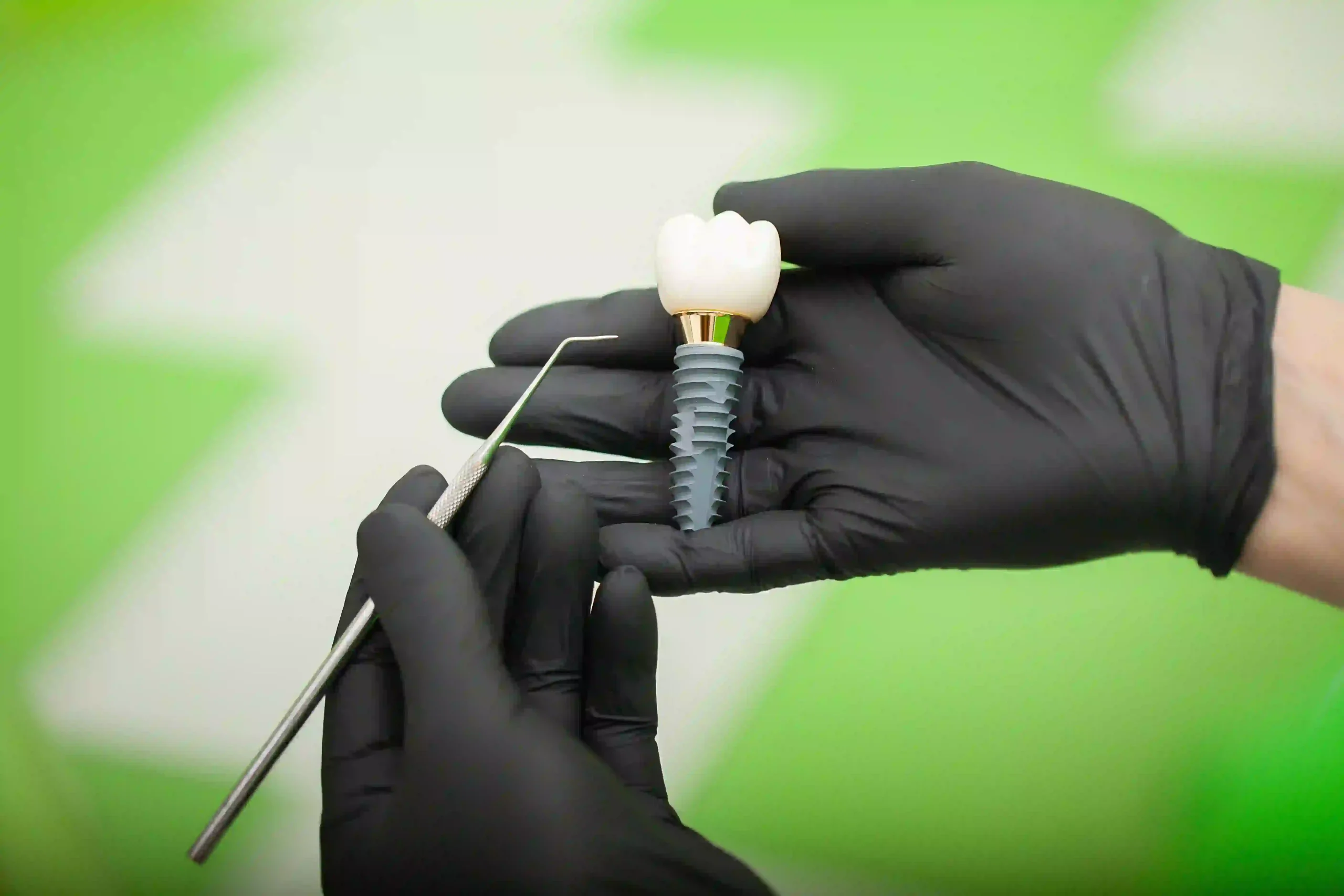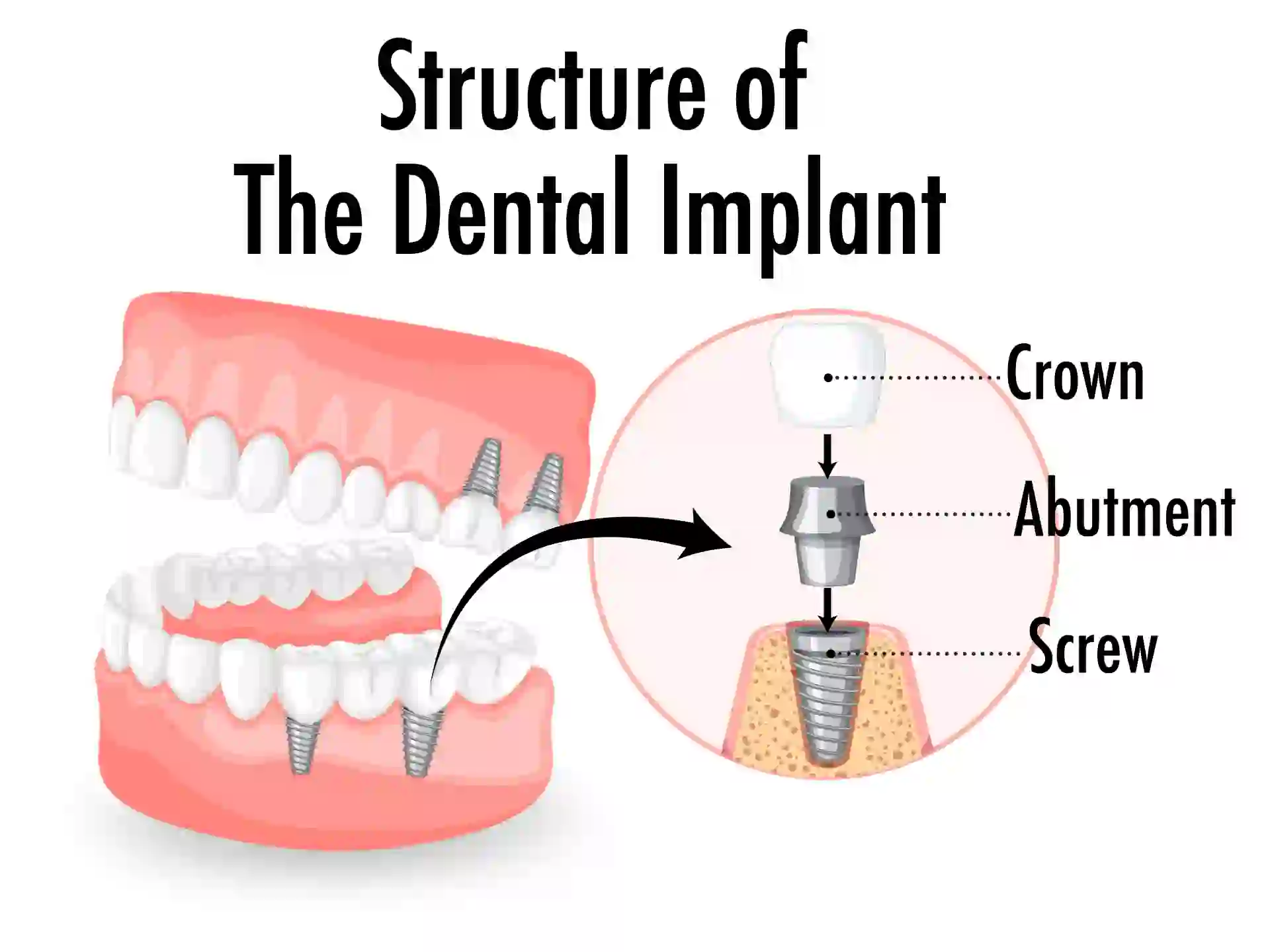Who among us hasn’t dreamt of a perfect smile, with a full set of aligned teeth? Some of us can achieve this with a simple teeth whitening or a new set of dental veneers for example. While others suffer from teeth that are beyond simple restorations, teeth that need to be replaced completely. This raises some questions as to what can replace a natural tooth. What can replace a strong and healthy tooth that can withstand the wear and tear, and look aesthetically pleasing as well? Dental implants are the pinnacle of dental science and research, it’s the ultimate option when there are no other options left to restore your damaged teeth.
It all started in the 1950s, when a Swedish orthopedic surgeon by the name of P.I. Branemark discovered that titanium, which is the base of dental implants, can fuse naturally with the bones in our jaws. Resulting in what we consider now as the next best thing to real teeth.
How do dental implants work?
Losing a tooth due to injury or disease can lead to various complications, including rapid bone loss, speech difficulties, and changes in chewing patterns that cause discomfort. Dental implants surgery is used to replace missing teeth and improve your dental health as well as the quality of your life. The surgery starts at the root of the tooth by inserting titanium screw-like posts in your jawbone that act as a base for the artificial teeth. The artificial teeth or dental crown, is designed to look and function like a real tooth.

A dental implant consists of an implant body, an abutment, and it may include a fixation screw. The implant body is surgically inserted in the jawbone in the place of the natural tooth’s root. The dental implant abutment is then fixated on top of the implant body using the fixation screw, and extends through the gums to support the artificial teeth.

Dental Implant treatment process at Vera Smile
Dental implants in Turkey usually follow a general process, however, the skill and experience of the dental surgeon matter enormously. Here at Vera Smile, we work with the best surgeons, making sure our process is smooth and reliable.
Placing the dental Implant
At Vera Smile, We start by placing the dental implant during surgery, where our oral surgeon makes a cut to open your gum and expose the bone. We then drill holes into the bone where the dental implant metal post will be positioned. Since the post will serve as the tooth root, we implant it deep into the bone. This whole process will be done under anesthesia, so you will not feel any pain.
At this point, you’ll still have a gap where your tooth is missing. If necessary, we can place a type of partial, temporary denture for appearance. This denture can be removed for cleaning and while you sleep.
Osseointegration
We then wait for bone growth to initiate osseointegration, where the jawbone grows into and unites with the surface of the dental implant. This process, which can take several months (3-6 months), helps provide a solid base for your new artificial tooth — just as roots do for your natural teeth.
Placing the abutment
Once osseointegration is complete, we may perform additional surgery to place the abutment — the piece where the crown will eventually attach. This minor surgery is typically done with local anesthesia, where we reopen your gum to expose the dental implant. We attach the abutment to the dental implant. And then we close the gum tissue around the abutment.
In some cases, we attach the abutment to the dental implant metal post during the initial implantation, eliminating the need for an extra surgical step. However, because the abutment sits past the gumline, it’s visible when you open your mouth — and it will remain visible until your dentist completes the procedure. Some people prefer to have the abutment placed in a separate procedure due to this appearance.
Placing the artificial teeth
After placing the abutment, your gums must heal for about two weeks before we can attach the artificial tooth.
Once your gums heal, we’ll make more impressions of your mouth, that will help us craft the dental crown, your new realistic-looking tooth. The crown can’t be placed until your jawbone is strong enough to support the new tooth.
With the help of our dental specialist, you will be able to choose between a fix crown, a removable one, or a combination of the two.
Removable artificial teeth
This type closely resembles a traditional removable denture and can function as either a partial or full denture. It comprises artificial white teeth encased in pink plastic gum material. Attached to the implant abutment via a metal frame, it securely snaps into position. It offers ease of removal for both routine cleaning and any necessary repairs.
Fixed artificial tooth
This type involves permanently fixing an artificial tooth onto an individual implant abutment, either by screwing it in place or cementing it securely. Unlike other types, this tooth cannot be removed for cleaning or during sleep. Typically, each crown is attached to its own dental implant. However, due to the remarkable strength of implants, multiple teeth can be replaced by a single implant if they are bridged together, which is what we call multiple teeth dental implants.
FAQ
When do you need dental implants?
Dental implants seamlessly integrate with your jawbone, ensuring stability without slipping, noise, or any risk of bone damage, unlike traditional bridgework or dentures. Moreover, they are resistant to decay, unlike bridgework which is supported by natural teeth.
In essence, dental implants may be suitable if you:
– Are missing one or more teeth
– Have a fully developed jawbone
– Possess adequate bone structure to support the implants or are eligible for a bone graft
– Have healthy oral tissues
– Do not have medical conditions that impede bone healing
– Unable or refusing to use dentures
– Seek to enhance speech clarity
– Abstain from tobacco use
Are dental implants permanent?
Yes, dental implants are permanent. Once inserted and fused with the jawbone, they become part of your mouth. You don’t need to replace them or clean them in a different way than your natural teeth. At Vera Smile, we offer a guarantee certificate on all of our treatments, to ensure you wear your new smile without any concerns.
What are the types of dental implants?
Single-tooth dental implants
If you have a single tooth that needs replacing, your dentist will perform a single-tooth implant procedure, followed by the placement of a single replacement tooth or crown.
Multiple-tooth implants
If you’re missing a few teeth, your dentist might opt for a multiple-tooth implant procedure, where custom-made replacement teeth are used to fill the gaps.
Full-mouth dental implants
If you don’t have any teeth left, your doctor may opt for full-mouth implants, essentially replacing all of your teeth using all-on-4 dental implants or all-on-6 dental implant procedures to economize on the cost and preserve the health of your jawbone.
When do you need bone graft?
A bone graft becomes a necessary procedure when you have a weak jawbone, either it’s too soft or not thick enough to handle the pressure exerted from chewing. Which means that it will not be able to support the implant. At Vera Smile, we analyze your jawbone structure and ensure that it’s suitable before proceeding with the dental implant procedure. If that’s not the case, and if other options like the mini dental implants (MDIs) are not viable, then we opt for a bone graft procedure.
How long do dental implants last?
Dental implants are known for their long-lasting nature, often exceeding 10 years in lifespan, making them a wise investment. However, their durability can be affected by the materials used for the crown. It’s essential to differentiate between the root and crown when assessing longevity. The root can last up to 20-25 years, needing little maintenance if properly installed by a skilled dentist.
On the other hand, the crown’s longevity varies depending on the material used. While some materials offer better durability and aesthetics, on average, dental crowns can endure for 10 to 20 years. Despite the implants’ resistance to decay, maintaining healthy gum tissue around them is crucial as it can impact their lifespan.
Many mistakenly believe that dental implants require less care, leading to neglect of oral hygiene. However, post-implant care is straightforward. Regular brushing twice daily, flossing, and using antibacterial mouthwash can prevent harmful bacterial buildup, ensuring longevity and success.
How much do dental implants cost?
The cost of getting dental implants can vary considerably depending on how much dental work you need. You might need to replace just one tooth, a few teeth, or even all of your teeth with implants. If you’re only replacing one tooth or a few, the cost of implants is usually similar to other options like dental bridges or partial dentures. But if you’re replacing multiple teeth or need more complicated dental work, implants are generally more expensive than other methods like removable dentures or bridges that are fixed onto your natural teeth.
The actual cost you’ll pay for dental implants can range from a few hundred to several thousand dollars. It depends on things like how many teeth you’re replacing, whether you want removable or fixed replacements, if you need extra treatments like bone or tissue grafting, and the health of your jawbone and gums. Whether you’re using insurance or paying out of pocket. Where you are getting your dental implant treatment done also makes a difference, in addition to the type of procedure you go with, immediate dental implants or normal ones. The cost of dental implants in the UK or USA is much higher than in Turkey for example. Read our in-depth guide to learn more about how to maximize your savings.
The price of dental implants in Turkey can vary depending on which clinic you go to as well as the factors that we mentioned above. At Vera Smile, we give you a specific cost estimate that goes with the personalized treatment plan that outlines all the steps involved as well as the amount of time it will take. Make sure to contact us to know more.
What are the benefits of dental implants?
The benefits of dental implants include:
– Enhanced appearance, speech, chewing function, and overall oral health. Making patients feel confident, allowing them to smile, eat, and partake in social activities without concern about their appearance or the stability of their dentures.
– Preventing jawbones from shrinking because of bone loss.
– Protection of adjacent teeth and their enamel, as they do not require treatment for replacing a missing tooth, such as with a dental bridge.
– Resistance to cavities, implants do not decay unlike natural teeth.
– Allow for a fixed restoration rather than a removable prosthesis.
– Help retain removable prosthesis.
What are the risks of Dental Implants?
Here are the risks associated with dental implants:
- Damage to nearby natural teeth during implant placement
- Injury to surrounding tissues during surgery
- Potential injury during surgery, like a jawbone fracture
- Reduced function, feeling like the teeth don’t fit together properly
- Sensation of looseness or twisting due to a loose abutment screw
- Implant body failure, possibly due to infections (usually in diabetic patients) or delayed healing (usually experienced with smokers)
- Difficulty cleaning the gums around the implant, leading to poor oral hygiene
- Numbness after surgery from nerve pressure or damage
Remember to inform healthcare providers and imaging technicians about your dental implants before any MRI or x-ray procedures, as implants can affect the images. The FDA hasn’t reported any adverse events related to MRI or x-ray procedures with dental implants.